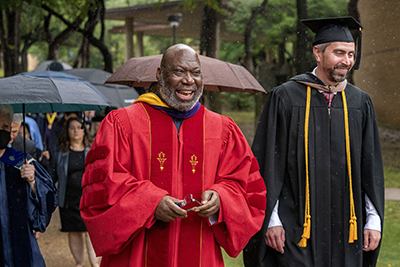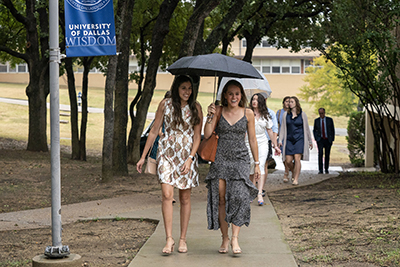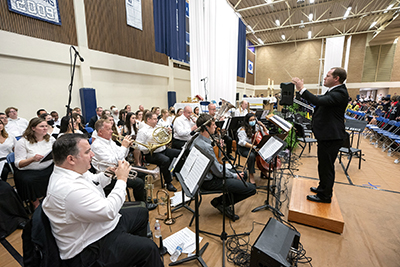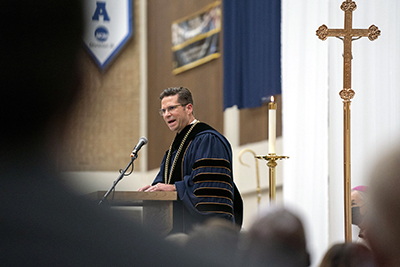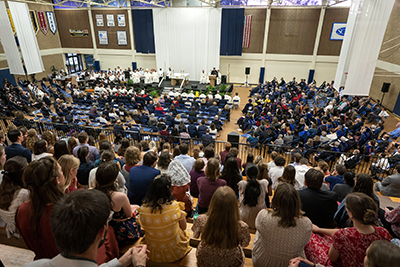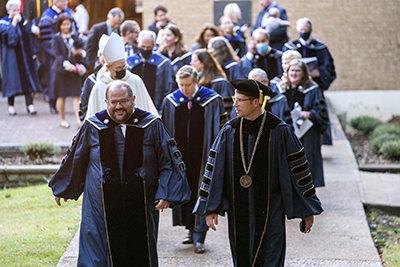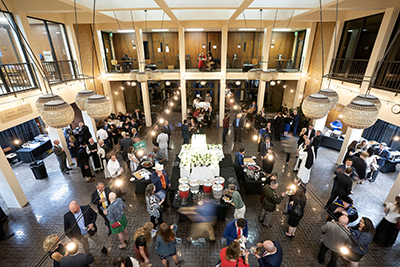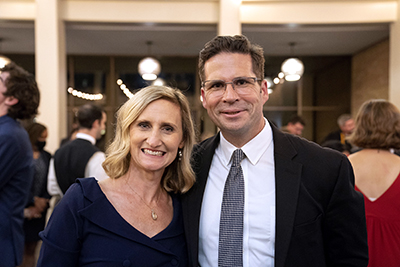 Menu
Menu
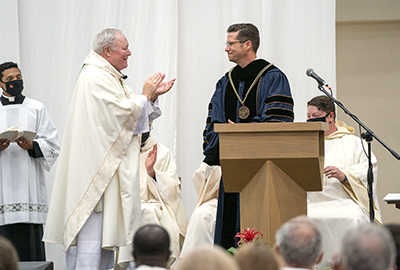
This is the address delivered by Jonathan J. Sanford, Ph.D., on the occasion of his inauguration as 10th president of the University of Dallas on Oct. 1, 2021.
Your Excellency, and Chancellor of the University of Dallas, Most Reverend Bishop Edward J. Burns; Chair of the Board of Trustees Richard Husseini; your Excellency, Most Reverend Bishop Gregory Kelly; Abbot Peter Verhalen, O.Cist.; Trustees of the University of Dallas; University Chaplain Fr. Joseph Paul Albin, O.P.; our many Concelebrants; Cistercian monks, Consecrated Sisters of the Dominican and Sisters for Life orders, Dominican Brothers, and other men and women religious; Seminarians of Holy Trinity Seminary and Redemptoris Mater Seminary; Knights and Dames of the Order of Malta; fellow university presidents and other university delegates; the esteemed faculty and dedicated staff of the University of Dallas; members of my family — my parents, Russ and Ruth, my in-laws, William and Peggy, my most remarkable wife, Rebecca, and our children; benefactors, students, alumni and all friends of the University of Dallas; what a joy it is to be with you this day. Thank you for your presence. Thank you for your support. Thank you for your prayers as I endeavor to serve faithfully and vigilantly this, our magnificent University of Dallas.
The opening lines of Plato’s dialogue Phaedrus have Socrates greeting Phaedrus with these words: “Phaedrus, my friend! Where have you been? Where are you going?” Phaedrus is a great lover of speeches, and he is taking a walk outside the walls of the city of Athens to reflect on and practice delivering a speech he heard from the sophist Lysias. The speech concerns love, eros, but it contains a most provocative thesis. Rather than arguing that thoughts and actions are best when motivated by love, it contends that relationships are best served when there is no affection involved. Given the tendency of love to go awry, we might be tempted to think that the speech of the sophist Lysias has hit upon a deep truth, namely that there is duty and security to be found in a commitment to passionless action. But that temptation should be avoided. On this both Plato and the Gospels agree: actions are rightly ordered to the good only when guided by well-ordered love, and whereas one can expect nothing great from the apathetic, disordered love at least bears the prospects of redeemability.
It is not my aim to provide you with anything like a thorough interpretation of Plato’s Phaedrus, one of the most fascinating and significant dialogues in Plato’s corpus, but I do want to dig in some of its fertile ground to plant the seed of my own speech. The dialogue concerns not just the nature of love, but the nature of words, and speeches in particular, and the manner in which words can both obscure and reveal reality. The purpose of speeches, Socrates states later in the dialogue, is to direct the soul (Phaedrus, 271d), and so there is an obligation that every speech giver has both to understand the soul and to discern the truth when he sets out to direct the souls of others. Socrates, displaying his own rhetorical prowess, provides a speech superior to Lysias’ in which he supports the same thesis as does Lysias, namely that actions motivated by something other than love are superior to those that are. Though the speech is very fine indeed, Socrates is deeply dissatisfied with it. Why? Because it obscures the truth of the matter: It is a speech which fails to fulfill that obligation that all rhetors have to direct souls well. The truth as concerns love is that, in fact, particular deeds and even one’s entire life are best when love serves as the principal motivation. Failing to love is a failure to acknowledge the creative and productive power of love. Now, it is not just any sort of love for any sort of thing that is best, but rather love that is perfected through cultivation of the virtues, and a love in which one yearns for those things that are truly good and beautiful. It is a love perfected by temperance and exercised with justice and courage that sprouts wings in a person so that he or she can soar, ultimately, to the very heights of heaven.
Where have you been? Where are you going? In the dialogue, these two questions put to Phaedrus are answered easily enough in our own cases if we consider merely the surface of things. You most recently came from your home, your dorm room, your hotel, to participate in this Mass and presidential installation. And, let me pause to express again my profound gratitude for your being here. Some of you traveled far indeed, and others were already near at hand, and still others have taken the time to be here virtually. But you have all come to mark this moment, to be part of this celebration which, though I am featured, is actually not about me but about this great Catholic liberal arts university and the glorious mission to which it is dedicated. From the bottom of my heart, I thank you.
The questions — Where have you been? Where are you going? — as with all things in those dialogues of one of the principal fathers of our Western intellectual tradition, have depth to them. Where have you been? At one level of depth, this question invites us to reflect on what and who have shaped us thus far. We all come from particular parents, born in particular locations at particular times, have a group of particular siblings and friends, and have had a practically infinite set of interactions with other persons and experiences that, in combination with our ongoing reflections, have given shape to our life’s story. When you make a new friend, you share some of those stories. Which ones? We tend to share the stories about ourselves that reveal our own loves, those things, those interests and goals, that reveal our heart.
One can press the question even deeper to strive to unearth the metaphysical depths of our being. Where have you been? Where do you come from? How did you come to be? What is your being? These questions lead us to reflect not just on the lines of our natural origins, our parents, grandparents, great grandparents, and so on. They lead us to reflect on divine origins. Do you, as well as your parents and grandparents, share a common origin in a divine being? Did God participate in your coming to be? Does God maintain your being even now? What or who is God? In what ways are you like God? In what ways are you unlike God? In Plato’s Phaedrus Socrates insists that the most important knowledge is self-knowledge, a point emphasized throughout the Platonic corpus. Pressing hard on the question “Where have you been?” brings us to the answer to that question. We are each imagines Dei, images and likenesses of God.
Where are you going? Like the first question, this one can be pressed beyond a surface answer to reveal two dimensions, a natural and a supernatural one. Where are you going? What do you intend to do with your life? What are your professional aspirations? Will you be married and have a family? How will you raise your children? What is your calling — professionally, personally, religiously? Just as we share our natural origins with our friends, so too do we share our aspirations. Where you intend to go and how you intend to live reveals your loves by laying open your heart.
As with our beginnings, so with our ends, the question of God and his role in where you have come from and whither you go emerge as we press on to the supernatural depths to which this question directs us. Does God want a relationship with you? What does that even mean? Why would God want you as his friend? What does God’s love for you reveal about yourself and the loves you ought to have now?
What does the University of Dallas have to do with either of these life-and-love-revealing questions? On the surface level, the University of Dallas is both an origin and a destination, a place to which some come and others go in any given year. It is the higher educational institution to which many come to receive an education and from which they leave to spend their lives growing into that education. More significantly, it is an institution that is a vital part of many life stories, a place of forming culture, creating friendship and family, and realizing one’s very humanity. Still further, through the education we provide at the University of Dallas, our students uncover and more deeply understand the very meaning of their lives and learn to listen to those callings that become their vocations.
There is another way to approach these fundamental questions with the University of Dallas in mind, one in which we think of it not just as the point of intersection and formation for many lives, but as itself a sort of living entity, an institutional being with a life of its own.
Where has the University of Dallas been? Where is it going?
Though young as far as universities go, the University of Dallas is old enough that some of its origin stories are tinctured with elements of sacred lore. The first iteration of the University of Dallas runs from 1905 through 1928. It was the Vincentian Fathers who founded Holy Trinity College in 1905 and renamed it the University of Dallas in 1910. They closed the University of Dallas in 1928, and the charter was given to the Diocese of Dallas. The Sisters of St. Mary of Namur obtained that charter in 1955 with the intention of folding Our Lady of Victory College in Fort Worth into a newly established University of Dallas. Something magical happened when an energetic bishop with a great deal of experience and a doctorate in history from Louvain, Bishop Thomas K. Gorman, was given back the charter for the University of Dallas from the Sisters of St. Mary of Namur later in 1955 and, together with a board of profoundly generous and daring businessmen, founded the University of Dallas in 1956. Our campus bears the names of those early great ones — Constantin, Gorman, Blakley, Haggar, Braniff, Maher. Bishop Gorman was convinced of the need to found not just another regional Catholic college, but a truly great Catholic university, one that would serve as a paradigm in the wider landscape of American higher education. He succeeded.
The first faculty were composed of some of the Sisters of St. Mary of Namur, members of the Order of Friars Minor and laypeople. The Franciscans pulled out after three years, but they were replaced, and in ways that remain significant and continue to nurture the charism and classrooms of the University of Dallas, by Cistercians who were refugees from then-Communist Hungary and by Dominicans from the Southern province who built their first priory on campus in 1958. The School Sisters of Notre Dame arrived in 1962 and provided invaluable teaching and administrative support. We are now mainly a lay faculty, but we have a new order of nuns, the Dominican Sisters of the Congregation of St. Cecilia, commonly known as the Nashville Dominicans, who comprise a part of our faculty, we continue to have Cistercians from our Lady of Dallas Abbey on our faculty, and the Dominicans provide excellent formation for our community through serving the chaplaincy.
Many lay men and women have had a profound effect on our university, but none so great as Drs. Donald and Louise Cowan. When they arrived in the 1960s, there was much good to build on, and high aspirations for what UD might become. But, it was the Cowans, originally charged with establishing an Honors College at UD, who instead built what is in effect an honors college for every undergraduate student. They were convinced that a shared curriculum was the most significant feature of a university education that would reclaim culture and revive the great Western intellectual tradition; as Dr. Donald Cowan observed, “The curriculum is the center of the solution; it must be the same for all students, but designed for the best — not in its complexity but in its imaginative scope and profundity.” And it was Dr. Louise Cowan who realized, together with Dr. Willmoore Kendall, Bishop Gorman’s dream of a truly distinctive graduate program, which came to be the Braniff Graduate School of Liberal Arts in which is housed what is now widely recognized as the strongest interdisciplinary Ph.D. program in the country, the Institute of Philosophical Studies. It was from Braniff that first the Graduate School of Management, named now after our generous alumni Satish and Yasmin Gupta, as the Gupta College of Business, sprung. And, so too, did the graduate programs in ministry find their origins in Braniff, UD’s incubator for creative and foundational graduate education.
The University Dallas came from the creative partnerships, bold acts and generous donations of dedicated dreamers and doers: Bishop Gorman and his band of backers, Donald and Louise Cowan, James Fougerouse and Steven Pejovich, Lyle and Sybil Novinski, and countless faculty greats from Frederick Wilhelmsen to Sister Mary Clodovia, from Father Placid to Charles Coppin, from Father Roch Keretsky to Robert A. Welch, from John Sommerfeldt to Raymond DiLorenzo, from Bob Lynch to John Alvis, from Bob Wood to Eileen Gregory, from Tom Jodziewicz to Bruce Evans. We burst forth from unflinching daring in tumultuous times, and built on what was then a wilderness of mud, grass and scrub trees in these bluffs near the Trinity River. We do well to remember our origins, to study the great words and deeds of our founders, refounders and innovators. They gave the form of this institutional being we are, and as Aristotle reminds us, form and fulfillment go hand in hand. In establishing our forms, our forefathers and mothers fulfilled us.
Where are we going? Ours is an institution that liberates. Ours is an institution that reclaims the great things of the past. Ours is an institution that incubates the great things of the future. Ours is an institution that is dedicated to the purposes of rebuilding culture in a world that seems to have lost its way. Ours is an institution which by its Catholicism points the way forward for healing in our Church and in our country. Ours is an institution that stands tall and strong, like the Braniff Memorial Tower on our mall, in the storms raging against those dedicated to the purposes of genuine education, to form students by wisdom, truth and virtue. How do we do this? Through dauntless dedication to the soul-enriching and culture-building excellent education that we provide.
As I say, ours is an education that liberates, and that is because of the manner in which the liberal arts are deeply ingrained within our very essence as a Catholic liberal arts university. The liberal arts are those disciplined ways of perceiving, knowing and thinking that cultivate an appreciation of truths for their own sake. The liberal arts free us from our own ignorance, unmooring us from false opinions so that we might grasp matters as they are, and transforming even our true opinions into knowledge by learning to give an account of the reasons why those judgments are true. The liberal arts free us from unperfected passions because, in order to cultivate these arts, one needs to develop certain habits, certain virtues, like moderation and the courageous pursuit of truth, in the very process of acquiring the ways of perceiving, knowing and thinking embodied in the liberal arts. The liberal arts free us to study things that require a great deal of attention which, were it not for the unique environment that college provides, we would not be free to study. The ancients called such an environment “leisure,” and the measure of a well-educated person is his or her ability to use well those times in which one can separate from the concerns of the moment. Such genuine leisure, the great philosopher Josef Pieper insists, is the very basis of culture, and at its root is, if not proximately then ultimately, the act of worship of the God who makes all things new. The liberal arts free our graduates to live lives dedicated to continuous learning, lives dedicated to an ongoing pursuit of the true, good and beautiful. A liberal arts education, through enabling our students to embrace more fully their own humanity, particularly as rational beings made to flourish in community with others, frees them to become leaders and responsible citizens.
It is a hallmark of our university that all our undergraduates share the same pathway through a robust and integrated core curriculum. The core is not meant only to make its mark on the first two years of education; rather, it forms the foundation for the entirety of one’s education understood as a lifelong pursuit. The attunement to the objects of inquiry cultivated by the liberal arts can be brought to bear on any inquiry whatsoever; its fruit is appreciating the things one studies for their own sake. There is no discipline that is not profoundly enriched by the attunement that the liberal arts yield. And, what justifies our being a university, a group of many disciplines turned toward one, is the convergence of truth from the various disciplines toward a unity of knowledge. It is those liberating arts that enable us to appreciate the unity of truth.
The Catholicism of this, our University of Dallas, undergirds the whole of our endeavors. The very idea of our university — that is to say its form, structure, substance and purpose — springs from ex corde Ecclesiae, from the heart of the Church, and we have ever aligned ourselves under the Church’s magisterial guidance. With respect to what unifies our various disciplines, Catholicism undergirds the convergence of truths by recognizing that the origin and summit of all truth has its source in God. With respect to the modes of freedom that our approach to a liberal arts education provides, Catholicism provides the richest of anthropologies that enables us to understand and try to realize what freedom exercised well entails. With respect to our student body, Catholicism opens us to students of all faiths and ethnicities, with invitations to Catholics and non-Catholics to experience more deeply the treasures of our faith. With respect to our campus culture, Catholicism firmly plants the divine liturgy as the deep root that holds in place our common life, guiding our approach to residential life, and athletics, and spiritual formation on campus, and the thousand ways in which the intellectual virtues our students are developing come to be interwoven with their moral and theological virtues, benefiting and benefited by each and every member of our community.
The University of Dallas has indeed realized Bishop Gorman’s intention of founding a great Catholic liberal arts university, but let us not pretend that there is not more work to be done in fulfilling our mandate. Whatever the undulations of our mall might suggest to you, our educational foundation is firm. We are doing well in providing an exceptional education to our students. But we need to ensure that our commitment to academic excellence is unwavering, and we need to invest more deeply in our existing and future faculty members. We provide an excellent moral and spiritual formation for our students, but the extreme isolation and digitally inspired loneliness of these times make it clear that we need to do more to ensure that our students have every opportunity to live lives as complete and integrated men and women. We are rebuilding our culture first and foremost through forming its future leaders in our classrooms, but there is more we can do in service to Church and country, including for those who will not be privileged with the opportunity to matriculate at this, our great University of Dallas. I invite each of you into our efforts to strengthen our foundations and to build upward and outward from them over the course of what, God willing, will be a very long period of stability, growth and cultural renewal as I endeavor to discharge faithfully my duty to lead this institution by the sister virtues of humility and magnanimity.
I want to return to those opening remarks of Plato’s dialogue. We have taken up Socrates’ two questions, but the fact that Socrates greets Phaedrus as “my friend” should not be overlooked. Friendship is the pinnacle relationship that eros yields — a reciprocal love for another that enables both friends to endeavor for the true, good and beautiful. The love of friendship is at the heart of our education at the University of Dallas.
There are four spheres in which this love of friendship is relevant to our education. First and foremost, we cultivate a friendship with the truth. To be sure, my use of friendship in this context may seem a stretch since friendship requires reciprocal love. But, there is a manner in which the truths of things do yearn to be known by us, and that is precisely because they are known and loved by a loving God. God’s knowing love for the things He made in turn presents them as fit partners for our longing intellects, which yearn to be fulfilled by the very essence of the beings we study. Learning to be good friends of the truth requires a great deal of habituation, the cultivation of those virtues of liberal learning that enable us to progress in this path of friendship, virtues such as intellectual humility, a sense of wonder, perseverance and savoring the truths we seek when they are grasped. Cultivating these virtues requires friends, and at the same time cultivates a deepening of those same friendships between students, between professors, and between professors and students. Ultimately, our education cultivates a friendship with our God who deigns to call us friends. It is not an exaggeration to say that the education we provide is a friendship nurtured for the sake of friendship.
Genuine friendship is founded upon arete, the Greek word for excellence or virtue. It is virtue that perfects our friendships with the truth, with our peers, with our mentors, and with God. It is excellence that is our guideword as we endeavor to do all things well. I look forward to the opportunities to explore deeply this theme in the coming year in my inaugural series, “Arete: Renewing Culture through Educational Excellence.” This theme describes our call: The University of Dallas is uniquely positioned to revive our wounded culture through its unwavering commitment to an excellent Catholic and liberating education. We are called to effect healing and unity through the deep truths we communicate about the human person and our common desire to flourish in communion with others, our countless endeavors to promote all that is good, true and beautiful, and the many ways in which we foster magnanimity, which is that virtue that entails all the others and puts them at the service of glorious and good works.
As we strive to build on and share more broadly the vital cultural resources that our university provides, we need always to remember that our principal work is to be found in our classrooms, in the work of our professors engaged in research and works of artistry, in the work of our graduates who live their lives excellently, and in the work of all those inspired by our great mission to renew culture through excellence in education. Our work is truly noble. Our work is sorely needed. The University of Dallas matters for this Dallas/Fort Worth metroplex, it matters for Texas, it matters for the United States of America, it matters for our world. Let us begin again the great work to which our beloved University of Dallas is already dedicated.
